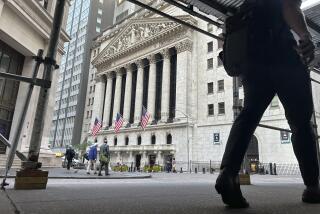Dow Index Inches Up 7.63 to Close at 1,958.72
- Share via
NEW YORK — Stocks barely broke a two-day losing streak Thursday in a partial recovery that traders attributed to bargain shopping and slightly eased tension over inflation, but the outlook on Wall Street remained bleak.
The Dow Jones index of 30 industrials, which fell a total of 56.54 points on Tuesday and Wednesday and dropped another 25 in early trading, rebounded and finished up 7.63 to 1,958.72.
Broader market indexes were mixed.
Declining issues outnumbered advances by about 4 to 3 on the New York Stock.
NYSE volume totaled 165.16 million shares, down from 209.42 million shares in the previous session.
To a large degree, the Dow Jones index’s behavior echoed movements in the bond market, which in turn echoed movements in the Commodity Research Bureau (CRB) index, a key measure of inflation that tracks commodity futures prices in Chicago.
The CRB index rose sharply in the morning, heightening inflation fears, raising yields in the bond market and depressing stock prices as bonds became a more attractive alternative to stocks.
The CRB index later retreated when soybean futures weakened, easing bond yields and helping the stock market rise.
“The funny thing is how the market is so tuned to inflation, it turned on the commodity price index, which was turned on and off on soybeans,” said Lawrence Wachtel, a senior vice president at Prudential-Bache Securities in New York.
“This shows how graphically the stock market has become a commodity business,” Wachtel said. “We’re subject to the vagaries of traders in the pits of Chicago.”
Some traders said eased yields in the bond market were viewed as a reason by some investors to do some bargain hunting in stocks.
Gene Seagle, director of technical research at Gruntal & Co., said the bond gains were “a pretty sizable indication of the beginning of the end of the (stock market) decline.”
But some traders said that any more indications of higher inflation likely would weaken stocks again. One possibly destabilizing figure was the Labor Department’s consumer price index for April, scheduled to be released this morning.
Stock prices in Tokyo and London declined Thursday, both coming under pressure from Wall Street’s weakness, which has been linked to fears of interest rate increases.
The Tokyo Stock Exchange suffered its biggest decline of the year with the Nikkei 225-share index sinking 394.34 points to 27,373.24.
In London, the Financial Times 100-share index was down 17 points at 1,760.6.
More to Read
Inside the business of entertainment
The Wide Shot brings you news, analysis and insights on everything from streaming wars to production — and what it all means for the future.
You may occasionally receive promotional content from the Los Angeles Times.










